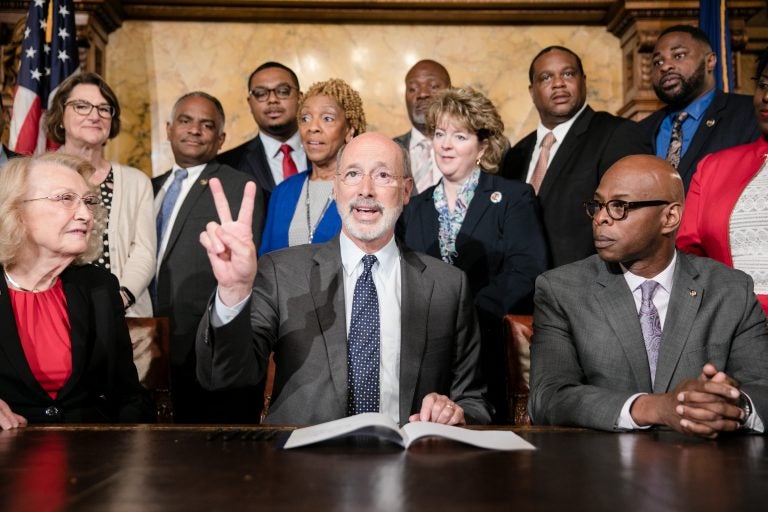Gov. Wolf signs law making Juneteenth official state holiday
Pennsylvania is permanently recognizing Juneteenth, the cultural holiday commemorating the emancipation of enslaved black people in the United States.

Gov. Tom Wolf declares Juneteenth "National Freedom Day" in Pennsylvania. (Gov. Tom Wolf's Office/Flickr)
Gov. Tom Wolf signed a law on Wednesday designating June 19 as “Juneteenth National Freedom Day” in Pennsylvania.
“While Independence Day marks the conception of a free nation, Juneteenth is a celebration of the fulfillment of this ideal through the Emancipation Proclamation,” Wolf said in a press release. “In honoring this day, I encourage all Pennsylvanians to reflect on the struggles and sacrifices our forefathers made to give us freedom, while realizing the importance of continuing to build a nation that truly reflects the self-evident truth that all people are created equal.”
Observed by 45 other states and widely celebrated across Pennsylvania, Juneteenth marks the day in 1865 when enslaved people in Galveston, Texas — the last Black slaves in the U.S. — learned they were finally freed after the Civil War ended on April 9, 1865.
The occasion occurred more than two years after President Abraham Lincoln issued the Emancipation Proclamation in which he freed the slaves in the “rebellious states” and technically ended 244 years of slavery in America.
“On Juneteenth, we commemorate the day when millions of African Americans were freed from the horrors of slavery. We also celebrate the continued education and achievement of African Americans, in the face of overwhelming discrimination and hardship,” said state Rep. Stephen Kinsey, Chairman of the Pennsylvania Legislative Black Caucus, in a press release. “Today should be a reminder to us — as individuals, as institutions — to recommit to liberty, justice and equality, so we can move our nation forward, providing opportunities and promoting success for all.”
The law, House Bill 619, was proposed by state Rep. Susan Helm (R-104).
The state House unanimously passed the bill last month, and the Senate unanimously passed it last week.
“I am thrilled to see House Bill 619, Juneteenth National Freedom Day, signed by the governor, and I thank him and my colleagues in the House and Senate for their unanimous support,” said state Rep. Sue Helm in a press release. “I hope that the annual observance of Juneteenth will lead to more knowledge and awareness of the events that unfolded in the years after the Emancipation Proclamation, and will help to tell the whole story of the abolition of slavery.”
While the law commemorates the important date in U.S. history, it does not call for employers to treat June 19 as a legal or official holiday.
The National Juneteenth Observance Foundation is campaigning to make the occasion a national holiday.
WHYY is your source for fact-based, in-depth journalism and information. As a nonprofit organization, we rely on financial support from readers like you. Please give today.




